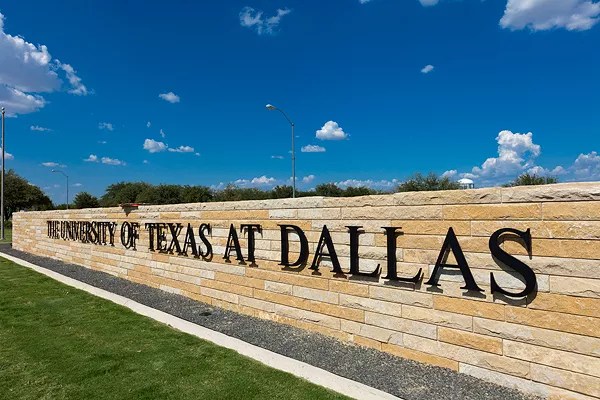
University of Texas at Dallas

Audio By Carbonatix
A number of professors at Texas universities are concerned about academic freedom and free speech on campuses, a report released Thursday by the Foundation for Individual Rights and Expression (FIRE) found.
The report – developed from a survey that asked questions intended to gauge faculty’s perceptions of campus free speech climates – includes input from 418 professors from Texas A&M, the University of Texas at Austin and the University of Texas at Dallas. Over 6,200 tenured, tenure-track and non-tenure track professors from 55 universities across the country responded to the survey.
The organization regularly evaluates student perspectives on free speech for FIRE’s college free speech rankings, but this is the organization’s first time researching faculty. According to the report’s chief author, Nathan Honeycutt, there is a dearth of research on faculty free speech, and the FIRE report is the most extensive ever published on the topic
Of the three Texas universities evaluated, it was UT Dallas, which had 48 professors respond to FIRE’s survey, that stood out most to Honeycutt.
“Twenty-seven percent [of UT Dallas professors] said they’ve been disciplined or threatened with discipline compared to 7% in Austin,” Honeycutt told the Observer. “Something odd is going on there for sure, that’s what our data suggests.”
(UT Dallas has received “correctional correspondence” from FIRE three times in the last two years, addressing student free speech violations.)
Nearly half of the UT Dallas professors who answered the survey reported they have “recently toned down something they wrote for fear of causing controversy.” More than half of the respondents reported that academic freedom is “not very” or “not at all” secure on UTD’s campus, and 52% are unsure if the UT Dallas administration protects free speech.
At UT Dallas and UT Austin, respectively, 66% and 70% of professors reported that it is difficult to have “open and honest conversations” about the Israeli-Palestinian conflict on their campus. More than half of respondents from both schools also flagged racial inequality as a hot-button topic that faculty are struggling to speak about, with gender inequality at UT Dallas and transgender rights at UT Austin being a third problematic topic of discussion.
“Kind of disappointingly, large numbers of faculties report that they self-censor, report that they’re afraid that they might lose their job or damage their reputation,” Honeycutt said. “These are things that kind of go against what many consider to be the purpose of the university: pursuing truth, studying topics that might be controversial, topics where there isn’t a consensus.”
Of the 6,269 national faculty surveyed, one third reported that they have toned down their academic writings to avoid controversy. This was especially worrying to Honeycutt, because the number has quadrupled since 1954, when the same question was posed to social scientists at the height of McCarthyism.
Although the U.S. hasn’t completely devolved into the chaos of the 20th-century red scare, some of the images then and now are strikingly similar. Take the congressional hearings into on-campus antisemitism that resulted in the resignations of three Ivy League presidents, or the sweeping state legislation in Florida and Texas aimed at banning DEI initiatives; Honeycutt believes both could be causing a chilling effect on academics.
“I would say that probably is contributing to some of the fear and consternation among faculty,” he said.
Texas is no stranger to political involvement in higher education. Last spring, Texas Gov. Greg Abbott deployed Department of Public Safety officials to break up pro-Palestine student protests at UT Austin, a move that was criticized by free speech advocates. Public schools across the state have issued waves of faculty layoffs to eliminate pro-DEI staff positions.
The effect is a growing number of university faculty members who are dissatisfied with their situation and would not recommend their place of work to an out-of-state colleague, the Texas chapter of the American Association of University Professors warns.
But Honeycutt hedges that while a startling number of faculty members reported troubling experiences with free speech or academic freedom, many did not. In university environments where faculty members align ideologically, the data suggests there is less pressure for professors to hide their political beliefs in order to keep their job. At UT Austin, which saw 60% of responding faculty members identify as liberal, 74% said they “rarely” or “never” shied away from sharing their political stances.
One UT Austin professor, though, stated that their comfort level in sharing their opinions ends in uncertain company. Conservative professors were three times more likely than their liberal colleagues to feel pressured into hiding their beliefs for the sake of their employment, the study found.
“Even as a tenured full professor, I feel pressure to conceal certain opinions. The atmosphere in certain academic units can be cult-like and fascistic, and I really feel I have to pick my battles,” the professor told FIRE.
Because the report is the first of its kind and scope, Honeycutt is unsure how universities will respond to the finding that faculty members believe they are on unsure footing.
“I think a lot of times faculty feel siloed, or they feel that they’re alone, that there’s no others out there who hold their same views or who are experiencing the same things as them. So I’m hoping that to a degree, this data might be encouraging,” Honeycutt said. “Maybe they’ll just be more courageous. I think more courageous faculty will go a long way in improving the confidence and trust that the public has in these institutions.”